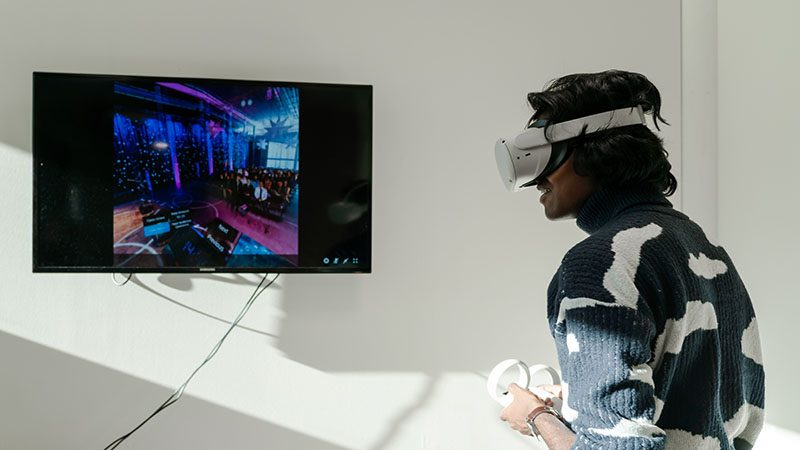Implementing VirtualSpeech into Maastricht University's School of Business and DEXLab
Highlights
- Students have spent 55,000+ minutes in VR; the equivalent of 916 hours of teachers time
- 96% of students agree that using VirtualSpeech is realistic preparation for a final presentation
- 94% of students agree that the feedback was valuable
- 97% would recommend the training to their peers

Customer Introduction
Maastricht University's School of Business and Economics Digital Experience Laboratory (DEXLab) is a digital research and education community, providing a space for research, learning, and knowledge exchange around user's digital experiences in business environments.
One of the core missions of the DEXLab is to further the understanding of technology-enhanced learning with methods such as virtual reality and artificial intelligence.
At the DEXLab, VirtualSpeech is used as a tool for both education and research. The use of VirtualSpeech at Maastricht University is part of a PhD research conducted by PhD Candidate Roberta Di Palma on the feedback mechanisms enabled via VR.
Thanks to this research project, four out of six Maastricht University faculties will pilot the use of presentation skills training in virtual reality, specifically through VirtualSpeech. Pressentation skills are a fundamental skill taught at problem-based learning system universities.

Credit: Maastricht University (https://www.sbe-dexlab.com)
The Problem
Students in higher education need continuous, personalised, and high-quality feedback to develop and enhance the practice of their (hard and soft) skills. Yet, providing such feedback requires significant resources, such as a large amount of teaching personnel with adequate expertise and appropriate time for giving feedback.
As this is often not the case, students continuously report receiving sub-standard feedback in higher education.
The Solution
Virtual Reality enabled feedback, for example for presentation skills training, offers potential solutions to this problem. At the DEXLab we aim to implement a pre-existing AI-Based Virtual Reality (VR) presentation practice tool like VirtualSpeech, for our students to train with.
Quantity of individual feedback for oral presentations, especially in group presentation settings, is often limited and majorly focused on the quality of the presentation's content rather than presenter's form.
However, students seek detailed individual feedback in order to further enhance their presentation skills. Implementing an automatic, non-content-based feedback system, which provides real-time feedback on the presenter's eye contact, loudness, listenability and use of filler words, as well as a supportive audience in VR, greatly benefits students ability to freely practice and improve their presentation skills.

Results and Benefits
Implementing a VR training assignment in a course which aims to develop students' presentation skills presents many advantages for both students and teachers.
For students, VR training is found to reduce communication related anxieties thanks to the presence of a realistic and engaging audience, availability of multiple realistic training scenarios and real-time feedback provided by the AI embedded in the software.
One student commented:
"It actually feels real and gives you a realistic training without having any real people. I liked that the feedback was instantly after."
Another reported:
"I really liked the feedback about the filler words, the pace, and the eye contact, because it helped me improve and I did it better the second time. If I would have practiced at home for the presentation, I would not have had feedback and I wouldn't have known what to improve or what to pay attention to."
For teachers, a VR training produces time-savings in terms of reduced teacher-led feedback on the presentation form and enables teachers to focus their feedback on the content-related aspects of the student's presentation.
Overall, thanks to the VR training both students and teachers can enjoy higher quality presentations.
When asking 100 students about their experience with VirtualSpeech, we observe the following results:

- 96% agree that using VirtualSpeech is realistic preparation for a final presentation (60% strongly, 36% somewhat)
- 90% agree that they found the task to be motivating (70% strongly, 20% somewhat)
- 94% agree that the feedback was valuable (72% strongly, 22% somewhat)
- 97% would recommend the training to their peers (77% strongly, 10% somewhat)
The wider pilot project is ongoing and official results and findings will be shared at a later date.
Additional student comments:
"The feedback was very useful and accurate."
"It is impressive, you really have the feeling to present in real life"
"I liked that it gave feedback on things we normally overlook, such as speech tempo or filler words"
"It is really immersive, and it looks a lot like reality. That is important because that is why it is useful"
"I really like the feedback as soon as I finished presenting, and that I felt immersed in the situation, as if there was a group of people in my room"
"The scores provided have great feedback about my presentation skills and through the recorded audio allows you to fix the problematic aspect. So, for myself it is the scoring"